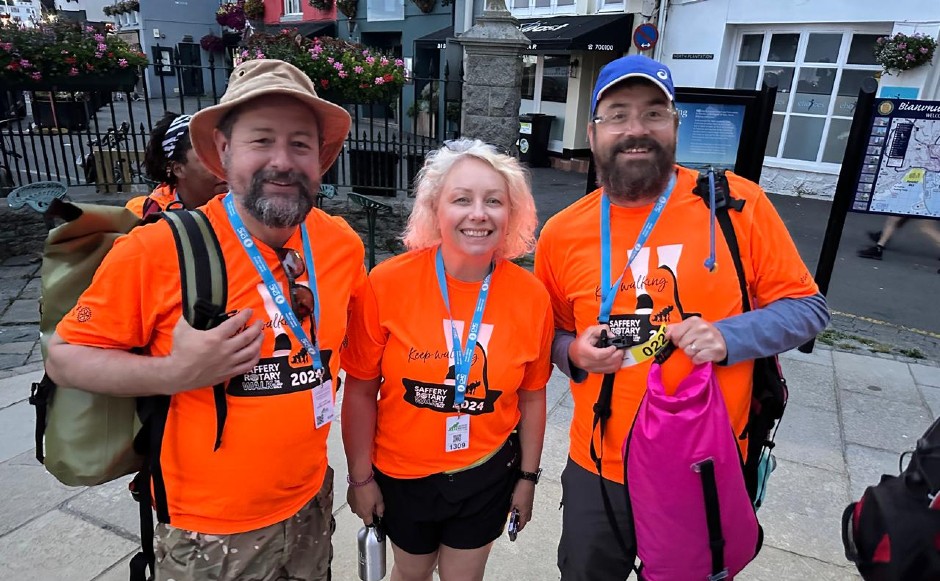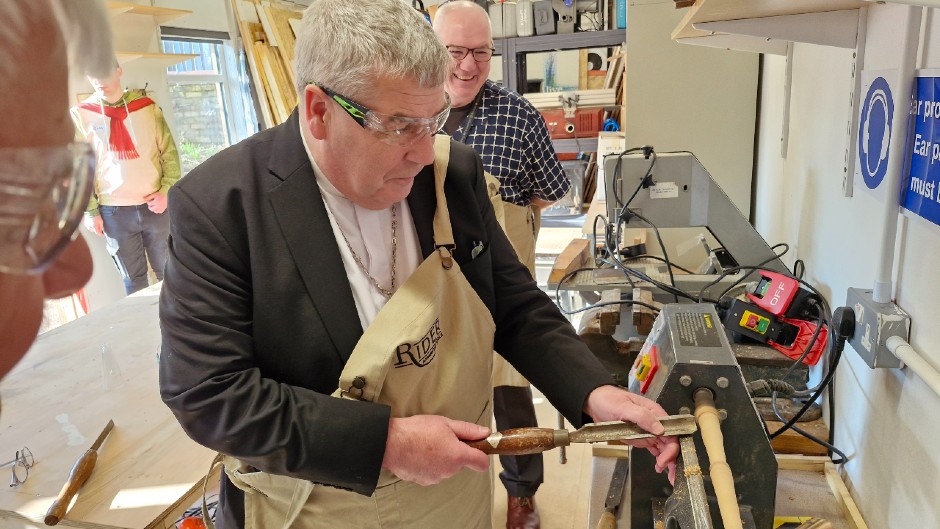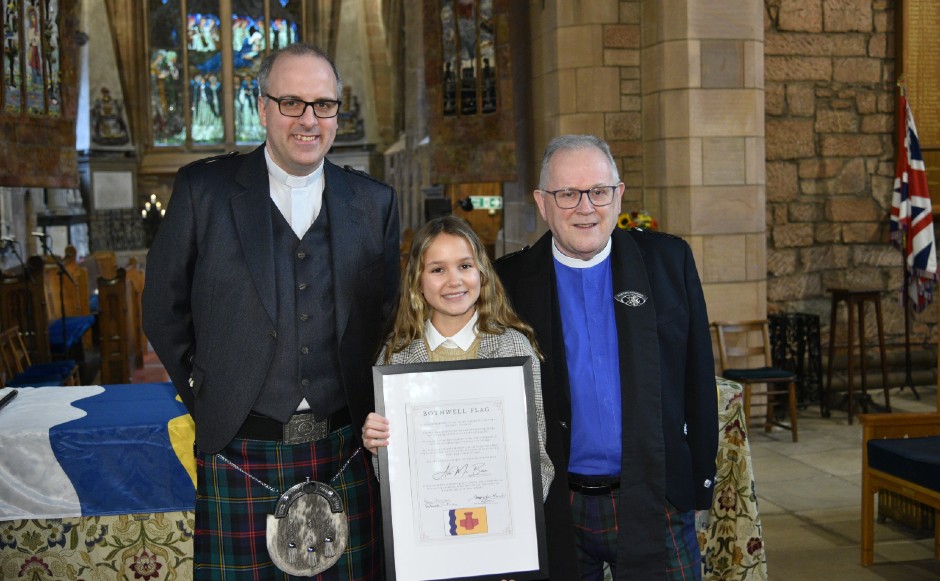Meet Ruth Harvey the new leader of the Iona Community
Published on 8 March 2021
Today on Monday 8 March, people across the world will celebrate International Women's Day by honouring the contributions of women in every sphere of life.
The Church certainly has many stories to tell. Since the time of Jesus women have been some of his most active and faithful followers. And within the Church of Scotland we can be proud of the long tradition of women serving God in a wide variety of roles, including today in every form of ministry.
In celebration of the day Life and Work magazine has given permission to reprint their profile of Ruth Harvey, the inspirational new leader of the Iona Community. This in-depth feature would normally only be available to subscribers to Life and Work magazine. We hope you enjoy it.
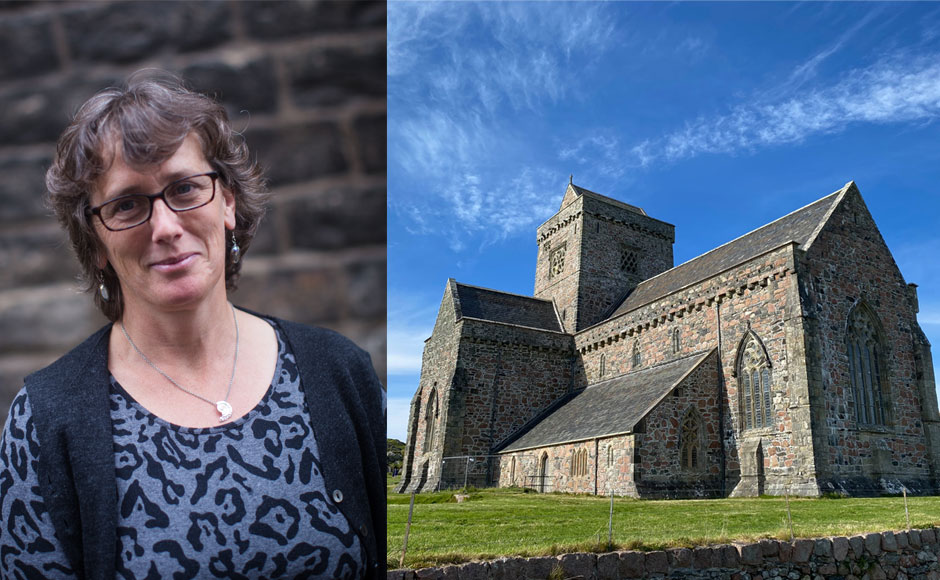
The Golden Thread
"I believe God weaves a pattern, a golden thread through all lives and all of life! This golden thread, the Holy Spirit, if you like, is alive and guiding me. This is the closest I can come to describing a vocation, or a sense of Calling – the nudge of God!"
The Rev Ruth Harvey is the current Leader of the Iona Community, a community that has been close to her heart for many years.
"I joined the Iona Community as a member in 1993, at the same time that I offered myself as a candidate for the Church of Scotland ministry," she says.
"But my involvement with the Iona Community has been lifelong, having spent many holidays on the island, then time there as part of the resident community as a child, followed by stints working at the centres, and at the hotels on the island during my student years.
"My membership of the Iona Community, the friendships that have evolved through this movement, have been crucial in my faith journey – I find amongst the members a space to ask big, deep, wide questions about faith while being very clear about the bias in the gospel towards the poor, those who are on the margins of church and society, and the work for justice and peace."
A radical experiment
Ruth's early years were spent in the Gorbals where her dad, John, was the minister.
"One of my earliest memories is of going with my dad to what was then Lauriston Renwick Parish Church in the Gorbals, to prepare the church for communion," she said.
"Back in the early 1970s we still had heavy white cloths that were pegged to the pews with silver buckles on a communion Sunday. It felt very grand and sombre! Three of us four siblings were born in a tenement on Abbotsford Place in the Gorbals in the 1960s, then dubbed one of the worst slums in western Europe.
"For us it was home and community. Mum, Molly, and Dad had made a commitment at the start of their marriage to live as part of the Gorbals Group Community with Geoff Shaw, the Holloways, the Fyfes and others – inspired by the East Harlem project in New York, each household tithed their income and took only what they needed for day to day living.
"It was a radical experiment in living alongside the poorest in society. When I was five, the magnificent, but badly maintained Victorian tenements in Glasgow, were demolished, and we moved away. The wrench was enormous – but we were always aware that the choices we had were much, much greater than the choices of our neighbours who were housed in schemes on the edge of the city.
"My parents' calling to living in community took them from the Gorbals to the island of Iona.
"Dad become Warden of the Abbey and Mum was housekeeper. Each Saturday up to 80 guests left the island, and a further 80 would arrive later that day. Each group that arrived to form community represented a mixture of society: rich and poor, young and old, privileged and marginalised.
"We lived first in Dunsmeorach, the big white house opposite the Abbey, and then in Iona Abbey itself – surrounded by guests and staff, volunteers and residents. The world came to our island."
It was Ruth's first meeting with Iona, an island that would come to mean more to her than she could have imagined.
The divine mystery
With such a varied life, school was something young Ruth had to cope with.
"I went to seven schools so I think ‘resilience' and ‘diversity' were the watch words in my education. On the whole I was happy at school. An island school of five, a village school of 100, and two secondary schools featured – so I had a fair exposure to Scottish education at its best (and worst – we were at school during the cuts of the 1980s). I think university got much more out of me, academically, than school. I was lucky to study first history at Aberdeen, then theology at New College in Edinburgh.
"The thread that kept my connection with faith alive was the Student Christian Movement – a fabulous network of open-minded faith seekers in which my questions were received with humour and respect, and my faith grew. I was introduced at this time to the world-wide church through the World Student Christian Federation and discovered a breadth and depth of liturgical and theological expression that complemented what I had ingested as a child of the Iona Community and the Church of Scotland.
"It was also at this time that I discovered the Religious Society of Friends. The silence, the depth of reflection in a collective space, the possibility of reaching for divine mystery with few words and much space was, and remains deeply moving and liberating."
Unity in diversity
Ruth knew that she wasn't ready to settle, and as a teenager, decided to travel. Not surprisingly, she was drawn to the communities where she was needed.
"As a 17-year-old I knew I didn't want to go straight on to further education," she laughs. "I raised funds through friends and trusts and set off for South India in October 1984. Met at the airport in Madras/Chennai by Dorothy Millar, I set out on a nine-month journey of growing and deepening, working alongside Maureen Macaulay, a Church of Scotland partner working as a physiotherapist in a Polio Rehabilitation Centre in Kanchipuram.
"Dorothy, her husband Peter and Maureen modelled for me the very best in what it means to be a mission partner – standing alongside the most needy in our world.
"Immersed in a Hindu culture, in one of the most densely temple-populated towns in India, developed a huge respect for my friends and colleagues of all faiths in the PRC. Discovering that my faith was strong while at the same time I was able to live well alongside those with a different faith, language and culture to my own was a ground-breaking experience that I had to live in my own body. I have remained committed to unity in diversity ever since."
Growing up and growing deep
Her time in India was both a renewal, and a touching of the past.
"One special connection for me is that on my return from India I spent time with my grandfather, Hugh Douglas, a one-time Church of Scotland Moderator who had some of his early years in India. On his death, we heard that money was donated towards a renewed well in the Polio Rehabilitation Centre where I had volunteered in India – ‘if you think that's a coincidence, may you lead a very dull life' as George MacLeod would have said! I was also glad to be able to visit Jalna in north India where my great-grandfather, Robert Baillie Douglas, had been a missionary.
"I was in India at the time of the assassination of Indira Gandhi and the horrific Bhopal disaster. I travelled through the Punjab to Kashmir, spent time near the war zone in Sri Lanka, and visited the glorious hill station of Kodaikanal where my grandfather had been at school. This was a rich time of growing up and growing deep.
" I never take my choices and my opportunities for granted as a result."
A double calling
University called, and Ruth came back to Scotland to complete her studies.
"During my time at Aberdeen University, where I studied cultural history, I spent a semester at the university of Erlangen in southern Germany. I was one of the first Erasmus students.
"My first visit to Germany was in 1987 as part of a delegation of the European Youth Council in Europe. To travel across Checkpoint Charlie, to have a visa restricted for a very specific time period, to know (at that time) that I would never meet my new friends from Eastern Europe again was devastating and revelatory – once again I realised that despite my eclectic childhood I had been cushioned and was privileged beyond measure.
"This experience was heightened further when I spent a year living in Amsterdam in 1990 working for the World Student Christian Federation supporting fledging student groups as they emerged post-revolution across Europe.
"To stand alongside students hungry for radical gospel-inspired justice in Prague, Białowieża, Budapest, Berlin, Leipzig was humbling and inspiring. To welcome my friends from Dresden to Amsterdam, a journey none of us thought would ever be made, was one of the most profound experiences of my life.
"While in Amsterdam, and a member of the English Reformed Church in the Begijnhof (part of the Church of Scotland Presbytery of International Charges), I found myself exploring a double calling – to join the Iona Community, and to offer myself as a candidate for the ministry.
"Supported by the then Presbytery of Europe I found myself at selection school and duly enrolled as a candidate for the ministry at New College."
Delight and joy
Ruth has always felt a strong guidance by God, through her ‘golden thread'.
"There are days, and sometimes prolonged periods when this thread appears almost invisible, seems weaker and vulnerable. These, I now know, are times when I'm ‘less alive', not in a good place, in a job, or a context perhaps that is depleting rather than enlivening for me – times you could say when I'm further away from God. Conversely, I know times when this golden thread is throbbing and bursting with life, with energy, with delight and joy – and these are times when I have a strong sense that I am living life to the full, am happy and fulfilled: close to God.
I look out for the times of delight and joy; I am wary of times, and contexts when I am only noticing sadness and frustration. This is not to say I shy away from hard work: far from it! But I have begun to notice that God calls me to delight and happiness, and hard work for the good of all and for peace and justice in the world."
The art of listening
After nearly two years in parish ministry, Ruth still felt ‘nudged' elsewhere, and spent the next decade working as Director of the Living Spirituality Network, a project of Churches Together in Britain and Ireland supporting small retreat centres and ecumenical communities focussed on prayer and the renewal of worship, and then as Editor of Coracle, the magazine of the Iona Community.
"In the early 2000s an opening to join the Further Ministries Team with the presbytery of Annandale and Eskdale emerged," she says.
"This was a truly visionary approach to the ministry of the whole people of God – we were encouraged to work as a team of youth workers, facilitators, pastoral leaders to support the Presbytery as a whole. This felt deeply congruent with all that I had learned about the priesthood of all believers, and the wider ministries of the church while a student.
"I was delighted to be able to work for this team. This team-approach to ministries felt like the truest expression of my calling to ordained ministry.
"It was while working for the presbytery of Annandale and Eskdale that I came across Place for Hope. This was the first time that I'd heard colleagues in the church talking about constructive ways of approaching difference, transforming conflict and weaving the language of reconciliation into the fabric of church life.
"The golden thread of God's nudge came fully alive for me amongst the people and the workshops and the inspiring speakers at the Aviemore launch conference!
"After completing the training as a Place for Hope practitioner I was partnered with more experienced practitioners for my first few cases – and learned a huge amount about the art of deep listening, how to frame powerful questions in the context of tough disagreement, what to do when a conversation becomes heated or there is the threat of violence, and all the time reflecting on how God is calling us to embrace, to walk towards difference and there to find a deeper unity."
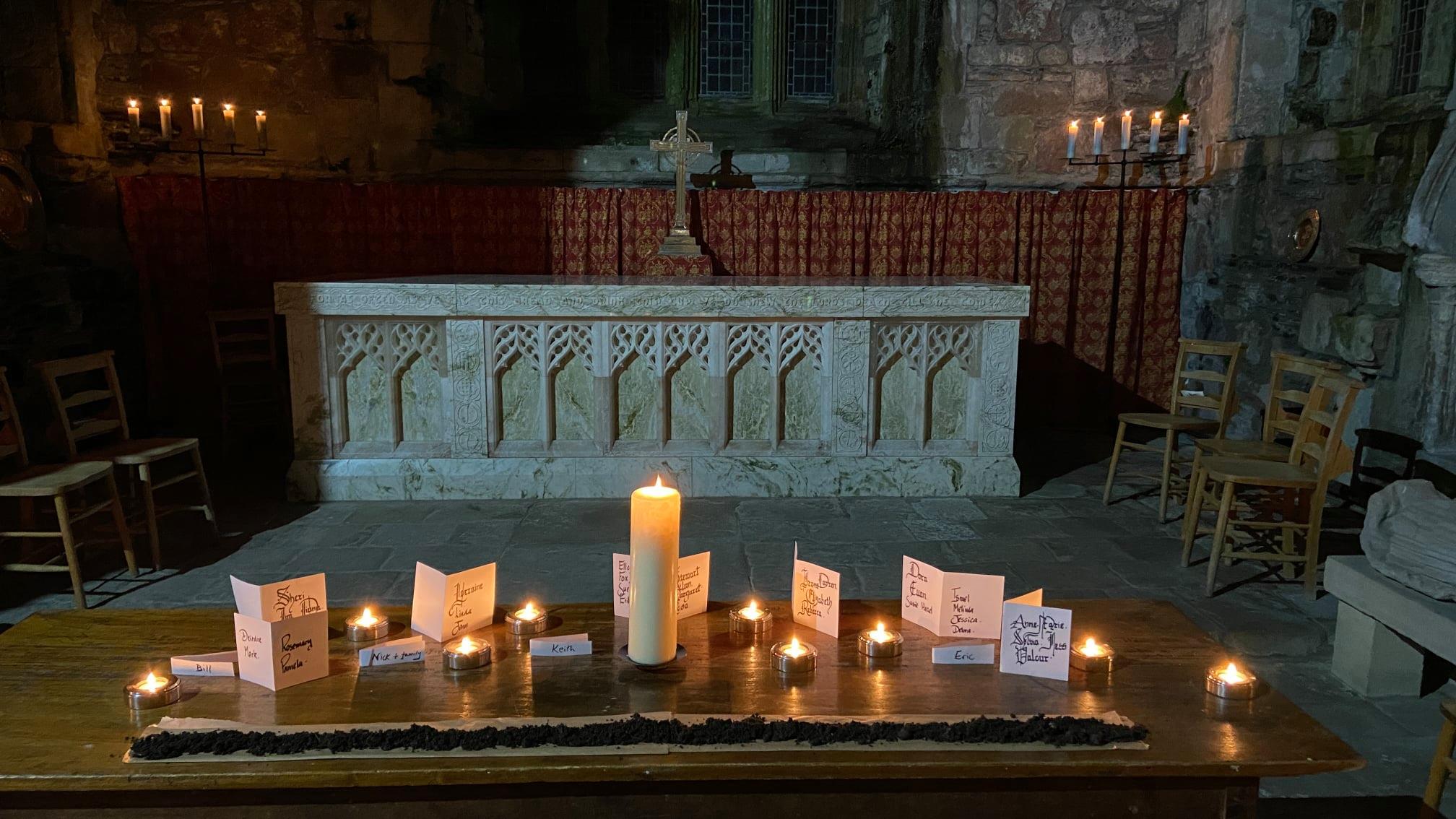
A new approach to leadership
After years of working with Place for Hope, Ruth took on the role of director, to join in with and support the growing network of faith-based reconciliation groups across the UK. Very little though, could have prepared her for her first year as leader of the Iona Community!
"I've been working for the Iona Community as Leader since June 2020 – it's been a bit of a rollercoaster, and not the start that I expected. One highlight has been the appointment of Sarah Metcalfe, another daughter of the manse, as the Executive Director for the Iona Community.
"This is a new post, signalling a new approach to collaborative leadership.
"I have responsibility for the membership of the Iona Community, including our public witness and pastoral care. Sarah has responsibility for the strategic and business development of the Iona Community.
The Iona Community is an interesting mix between being a global religious movement, a charity, and a business with a shop, a publishing house and three residential centres!
"Part of the renewal of our leadership structures in the last couple of years has included the launching of our Common Concern Networks. These are focussed groups of immensely skilled and passionate members and associate members who meet together to support one another and to take action around peace and reconciliation, environment, poverty, and other key concerns."
Giving thanks for the present moment
But there's another reason Iona is special to her too – she met her husband there.
"Nick and I met at the Iona Community's Camas Adventure Centre on Mull – and fell in love while cleaning the kayaks! We have a shared passion for the wild outdoors and live on the edge of the English Lake District which is stunningly beautiful. Nick works for the Outward Bound Trust as a Learning and Adventure Manager (hence our location). Our three girls are all wonderful advocates for youth today – full of life, big questions and deep compassion".
In between all the rest of her work, Ruth also finds the time to write books about experiences of spirituality.
And the future? Where does Ruth think the golden thread might take her next?
"I hope the golden thread will continue to guide me," she smiles.
"I'm trying, with help, to practise the art of living for and in the present moment – noticing what is around me, giving thanks for what is, and in humble gratitude for all on whose shoulders I stand. If I can enjoy the wild outdoors more, swim in the lakes and the sea, and continue conversations about faith, hope, love and doubt I'll be doing just fine! And if in the process the world can be a bit more just and fair, and faith-filled – I'll be delighted!" ¤
